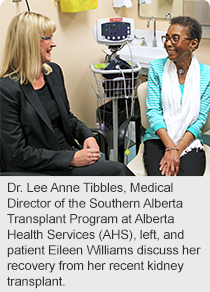
May 28, 2015
Story and photo by Colin Zak
Eileen Williams received her life-saving phone call last March.
After waiting 15 years for a suitable match, she was receiving a kidney transplant.
“It felt like a dream. Last Easter was the best one of my life,” recalls Williams, 64.
“It’s given me new hope for my future.”
 Unlike the majority of patients waiting for a kidney transplant, Williams’s immune system is ‘highly sensitized,’ making her body more likely to reject a transplanted kidney.
Unlike the majority of patients waiting for a kidney transplant, Williams’s immune system is ‘highly sensitized,’ making her body more likely to reject a transplanted kidney.
However, thanks to a national organ sharing program call the Highly Sensitized Patient (HSP) registry, Williams was able to receive a kidney.
“Previously, each province shares their kidney donors with local recipients, which meant a smaller donor pool for hard-to-match patients like Eileen,” says Dr. Lee Anne Tibbles, Medical Director of the Southern Alberta Transplant Program at Alberta Health Services (AHS).
“By collaborating nationally, the chances of highly sensitized patients receiving kidney transplants multiplies.”
Launched by Canadian Blood Services in October 2013, the HSP program has facilitated about 110 kidney transplants in Canada, including 11 in Alberta through collaboration with AHS.
The immune systems of highly sensitized patients are more likely to reject a transplanted kidney because of antibodies that develop to other people’s tissues. As a result, very few available donors can provide a match, and patients often wait much longer on average for a kidney transplant and have a greater chance of becoming ill or dying while they wait.
Immune system sensitization may occur from blood transfusions, previous transplants or pregnancies, which is why many highly sensitized patients are women.
About one third of patients waiting for a kidney transplant are highly sensitized.
“Finding a match for a highly sensitized patient means finding a kidney that contains no proteins to which the recipient is sensitized. These are transplants that, in all likelihood, would not have been possible without a national, co-ordinated system,” says Dr. Tibbles.
“As a result, these patients must wait many, many years on dialysis.”
For Williams, that means four-hour dialysis sessions, three times a week,
The HSP program gives provincial and territorial transplant programs access to a national pool of kidney donors for highly sensitized patients who need a more specific donor match, via access to real-time database.
Canadian Blood Services has supported the development of a state-of-the-art network of human leukocyte antigen (HLA) laboratories that perform the critical “organ matching” testing to support the HSP and other organ-sharing programs.
Dr. Patricia Campbell, Chair of the Canadian Blood Services National HLA, says that without a national registry, many highly sensitized patients would be unable to receive kidney transplants.
"When we look at the chance of them finding a compatible donor, they may match less than five per cent of our donor population,” Dr. Campbell says. “In Canada, there are 6,700 donors per year, so you imagine if now you are being looked at for a match not only with your local pool but also all of Canada. Your chances of finding a match are much greater."
For Williams, it was a day she thought might never arrive.
“Dr. Tibbles couldn’t stop smiling when she saw me the day of the operation,” she says.
“It’s wonderful.”